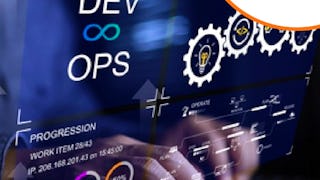This course equips you with core skills in build automation, CI/CD, and configuration management through practical use of tools like Maven, Gradle, Jenkins, and Ansible. Whether you're automating builds, setting up CI/CD pipelines, or managing infrastructure as code, you'll gain the essential knowledge and tools to streamline software delivery while boosting collaboration in modern DevOps environments.

Early bird sale! Unlock 10,000+ courses from Google, Microsoft, and more for £160/year. Save now.


Continuous Integration and Continuous Deployment
This course is part of Master DevOps: CI/CD, Automation & Monitoring Specialization

Instructor: Edureka
Included with 
Recommended experience
What you'll learn
Utilize Maven and Gradle to automate project builds and manage dependencies efficiently within DevOps pipelines.
Configure and manage Jenkins pipelines to enable continuous integration and deployment, including automated testing and notifications.
Implement configuration management and infrastructure automation using Ansible, integrating it with CI/CD workflows.
Apply CI/CD principles to automate software integration, testing, and deployment for faster and reliable delivery.
Skills you'll gain
Details to know

Add to your LinkedIn profile
June 2025
14 assignments
See how employees at top companies are mastering in-demand skills

Build your subject-matter expertise
- Learn new concepts from industry experts
- Gain a foundational understanding of a subject or tool
- Develop job-relevant skills with hands-on projects
- Earn a shareable career certificate

There are 4 modules in this course
This module introduces the fundamentals of build automation and its significance in modern software development. Learners will explore the features and architecture of Maven and Gradle, understand how these tools manage dependencies, and discover their roles in streamlining project builds.
What's included
24 videos6 readings4 assignments4 discussion prompts
This module explores continuous integration and deployment using Jenkins, focusing on its architecture, pipeline setup, and integration with tools like Maven and Gradle. It also overs plugin management, security, notifications, and automation best practices, with hands-on exercises for building pipelines and connecting Jenkins to version control and configuration tools.
What's included
34 videos5 readings5 assignments4 discussion prompts
This module explores configuration management with Ansible, focusing on its architecture, playbooks, roles, and ad-hoc commands. It demonstrates how Ansible supports consistent, scalable, and repeatable deployments, and highlights its integration with Jenkins for end-to-end automation.
What's included
20 videos4 readings4 assignments3 discussion prompts
The final module consolidates your learning through a practice project and graded assessment. You’ll apply the skills and concepts acquired throughout the course to real-world scenarios, demonstrating your ability to design, implement, and manage CI/CD pipelines and automated deployments.
What's included
1 video1 reading1 assignment1 discussion prompt
Earn a career certificate
Add this credential to your LinkedIn profile, resume, or CV. Share it on social media and in your performance review.
Explore more from Software Development
Why people choose Coursera for their career





Open new doors with Coursera Plus
Unlimited access to 10,000+ world-class courses, hands-on projects, and job-ready certificate programs - all included in your subscription
Advance your career with an online degree
Earn a degree from world-class universities - 100% online
Join over 3,400 global companies that choose Coursera for Business
Upskill your employees to excel in the digital economy
Frequently asked questions
This course introduces learners to Jenkins and its role in automating software builds, testing, and deployment. It focuses on building robust, automated CI/CD pipelines using Jenkins, integrating with tools such as Git, Maven, Gradle, Ansible, and more. It also covers the steps of setting up Jenkins, managing plugins, and creating pipelines to support continuous integration and delivery. The course also explains how to set up secure and reliable automation for building, testing, and deploying applications.
This course is designed for software developers, DevOps engineers, system administrators, and anyone involved in automating software delivery processes. It's also suitable for individuals who want to learn how to use Jenkins for continuous integration and deployment, and for those looking to improve their skills in building automated pipelines in real-world environments.
No, prior programming experience is not required. The course is designed for beginners, and you'll learn Jenkins concepts and CI/CD workflows from scratch. Basic knowledge of scripting languages like Bash or Python can be helpful but is not essential.
More questions
Financial aid available,




